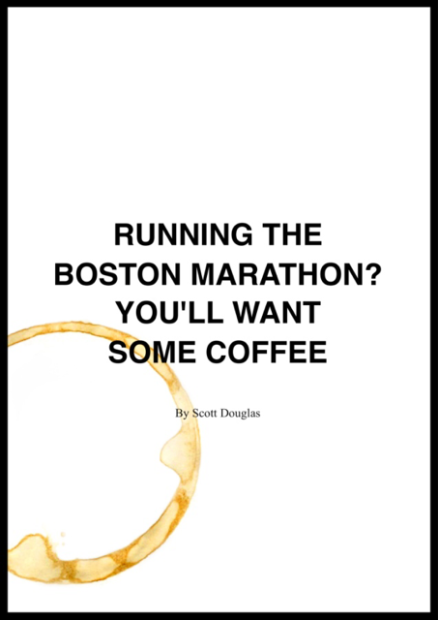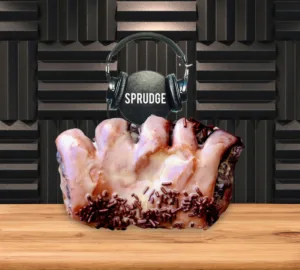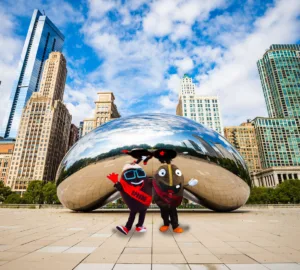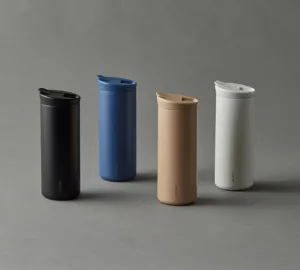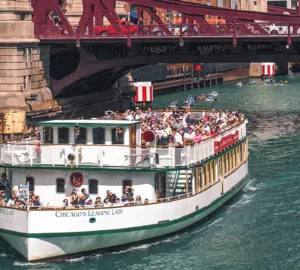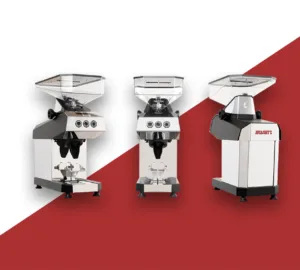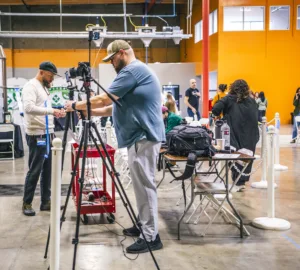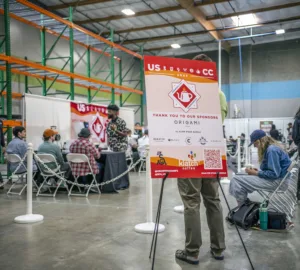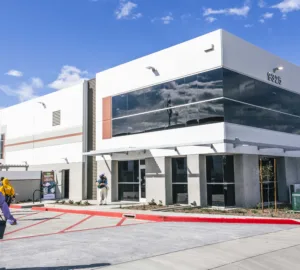As a Sprudge reader, you’re probably not big on waiting in line at Starbucks. But if that is your thing, then come to the Boston Sheraton early on Monday, the morning of the Boston Marathon. Even with the Starbucks-within-a-hotel opening at 5, an hour earlier than usual, the line will snake out of the seating area and into the lobby. Almost everyone in the line will then board a bus for the marathon’s start line in Hopkinton and their 26.2-mile run to the marathon finish in downtown Boston.
Non-runners tend to think marathoners are self-denyingly restrictive about many of life’s pleasures, including diet. So it might surprise you to hear just how much coffee is entwined with running.
“I couldn’t live without coffee,” says three-time Olympian Dathan Ritzenhein, the fastest American marathoner of 2012 and 2013. Dunkin’ Donuts is a sponsor of the Boston Marathon and the New York City Marathon (the world’s largest), among others. More informally, coffee shops throughout the country are standard meeting places for group runs. And I hope my employer won’t mind when I reveal that we rely on coffee-related articles to get great traffic on the Runner’s World website.
There are many good reasons for runners to love coffee. For starters, there’s the old runner’s saying, “Don’t leave the house until the coffee has left you.” A pit stop for a bathroom break is annoying on a normal training run, and disastrous during a marathon. Runners value coffee’s ability to get things moving internally. Like Ritzenhein, most have one or two cups about an hour pre-run.
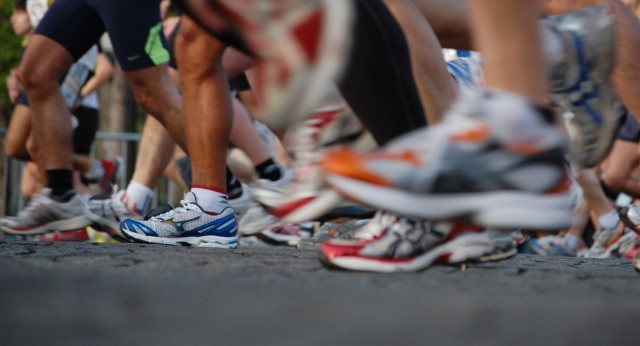
Most of the 36,000 runners in this year’s Boston Marathon fit in their training around busy professional and family lives. For many, that means training early in the morning. Here, coffee is valued for imparting the same mental snap-to-itness non-runners appreciate. “I definitely think coffee helps my morning run,” says Kristin Barry, a Scarborough, Maine resident who will run her third Boston Marathon this year. “I am more awake, alert and motivated to run.”
A lot of research has been conducted on whether and how caffeine affects athletic performance. (Some studies use coffee, others caffeine pills.) Of the many benefits found, two are of special interest to marathoners.
One consistent finding is that caffeine lowers what sport scientists call “rating of perceived exertion,” or how hard working out at a given intensity feels. The standard used in exercise labs is the Borg scale, which has people assign a numeric value between 6 (“no exertion”) and 20 (“maximum exertion”). Well-trained runners can sustain a heart rate of 80-85% of their maximum throughout a marathon. This intensity usually corresponds to about 16 (“hard”) on the Borg scale. Caffeine can lower that rating of perceived exertion by almost a point, closer to “somewhat hard.”
In other words, although the coffee-drinking runner is operating at the same percentage of cardiovascular maximum as her abstaining competitor, doing so feels a little less taxing. Pre-race coffee can nudge that feeling of “I need to slow down” toward “I can maintain this effort level” during the hours it takes to run a marathon. That helps sustain the positive self-talk that’s necessary over 26.2 miles, and delays the point in the race when you have to dig deep mentally.
If you can stand another mini-lesson in exercise science, here’s the chief reason marathoners love coffee on race day: It can help them avoid hitting The Wall, that infamous occasion late in the race when you have to slow dramatically.
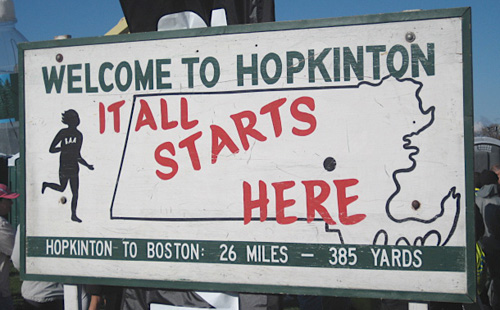
Glycogen is the stored form of carbohydrate that resides in your muscles and, with fat, fuels aerobic activity, whether that’s walking to the neighborhood coffee shop or running a marathon. The faster you go, the less fat you burn, and the more glycogen you burn. Trouble is, most people can’t naturally store enough glycogen to last them through a marathon if they’re trying to run the distance significantly faster than their normal training pace. When your glycogen stores are depleted, you’re left with burning stored body fat, which might sound great for weight-loss purposes, but isn’t effective at powering faster running. The result is slowing by a minute per mile or more.
Runners do many things to try to keep this from happening. One is training, which increases the muscles’ ability to store glycogen and teaches the body to burn a higher percentage of fat at a given pace. Another is carbohydrate loading in the few days before the marathon, which can supersaturate muscles with glycogen and buy you a few more miles. Another is taking sport drinks and gels during the race; the sugar in these quickly enters your bloodstream and is used instead of glycogen by exercising muscles.
And then there’s coffee. Research has shown that pre-workout caffeine increases blood levels of free fatty acids during exercise. (Free fatty acids are better at fueling faster running than stored body fat because they don’t require the relatively inefficient oxidization process body fat does.) As with the sugar from sport drinks taken on the run, free fatty acids in the blood are used instead of some of the glycogen stored in muscles. Coffee, therefore, theoretically helps marathoners spare their precious glycogen stores and maintain a faster pace to the finish.
“I can’t prove that coffee helps me spare glycogen,” says Barry, who has a personal best of 2:40. “But anecdotally, I’ve noticed that I hit the Wall in the marathons run without coffee and had plenty of energy in the ones run with coffee. I view coffee as a legal performance aid. Without it I would not feel ready to race.”
Pre-race coffee is believed to be so effective that even runners who usually don’t drink coffee before training do so the morning of a marathon. For example, John Kellogg, of Bexley, Ohio, who will run his first Boston Marathon on Monday, usually has his daily two cups after his morning run. But when it’s time to do battle, “one cup pre-race without fail,” he says. Ritzenhein and Barry have their normal pre-run amount before a marathon, although Ritzenhein omits his customary milk to lessen the chances of stomach issues past mile 20.
Runners have become even more enthusiastic about coffee in recent years. The conventional wisdom used to be that, despite coffee’s performance benefits, runners should be careful with it because it leads to dehydration via increased urination. But research has shown that not to be the case. Although coffee (and other caffeinated beverages) can lead to more bathroom trips in the short term, over the course of 24 hours it leads to no net water loss. The American College of Sports Medicine now says that coffee counts toward meeting daily fluid needs.
That’s great news for runners, many of whom would agree with Ritzenhein when he says, “That first cup, just sitting there waking up, is the best part of the day.”
Scott Douglas is senior content editor for Runner’s World. He can be found most Saturdays at Tandem Coffee Roasters in Portland, Maine.











